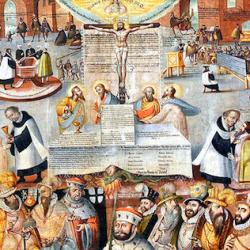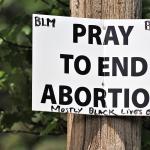Anthony Milton recounts (Catholic and Reformed) the debates within the seventeenth-century church of England concerning the status of the Catholic church.
It was a tricky question. If Anglican divines were too hard on the Catholic church, they provided ammunition for dissenting groups who suggested that the semi-reformed church of England might not be a true church either. It was tricky too because Anglicans were on the whole devoted to an Augustinian sacramental theology, and accepted the Reformers’ view that Catholic baptism was valid. That would argue for acceptance of the Catholic church as a true church, but then it became difficult to explain what was so wrong with Catholicism.
Part of the trickiness came from slippage in the usage of the term “true church.” In some contexts and in the works of some writers, the “true church” referred to the whole assembly of genuine believers who will be saved at the last day, and in that sense there were members of the true church in Rome. In other contexts and in the works of other writers, “true church” had a “governmental” sense, having to do with whether a particular visible church was sound. For some, “the difference between the Church of Rome and the Protestant Churches was expressed in terms of an absolute division, corresponding with the distinction between the true church and the false” (132). But not everyone blurred together these distinctions in this way. It makes for a confusing terrain.
Through it all, Milton argues that “most divines works on the practical assumption that Rome was a church, though unsound. This was as true for Luther and Calvin as for Elizabethan and Jacobean Protestants” (133). Almost invariably, this was qualified with a “secundum quid,” “in some sense.” And immediately after acknowledging the church of Rome in this qualified way as a true church, the writer would launch into polemics against Roman heresies and apostasy. Those like Joseph Hall who failed to qualify their affirmation of churchness of Rome sparked vehement controversy.
Some of the arguments got twisted in startling ways. Since her baptism was valid, the Roman church “met the crucial requirement for any church – that by baptism she brought forth children unto God.” But the church was so utterly corrupt that some Anglicans thought the children born into her by baptism would inevitably be poisoned. For Richard Field, the best hope was that after baptism infants would die before being poisoned by Catholic doctrine. Milton glosses, “The only hope for salvation in the Church of Rome was thus to die immediately after baptism” (135).
Another argument for Rome being a true church arose from the conviction that the Pope was the Antichrist: “Robert Some advanced as his first argument to show that ‘the Popish Church is a Church, though not a sound Church’ the point that ‘the pope is Antichrist, therefore the Church of Rome is a Church.’ He was able in 1588 to remark complacently that ‘no Protestant doubteth of the antecedent.’ If there were no marks of God’s church in the popish church, so the argument ran, then Daniel and Paul would not have foretold that Antichrist would sit in it. To deny Rome to be a church was to give Romantists a great advantage, since it implied that the pope could not be Antichrist” (139). An underhanded compliment to say the least.















